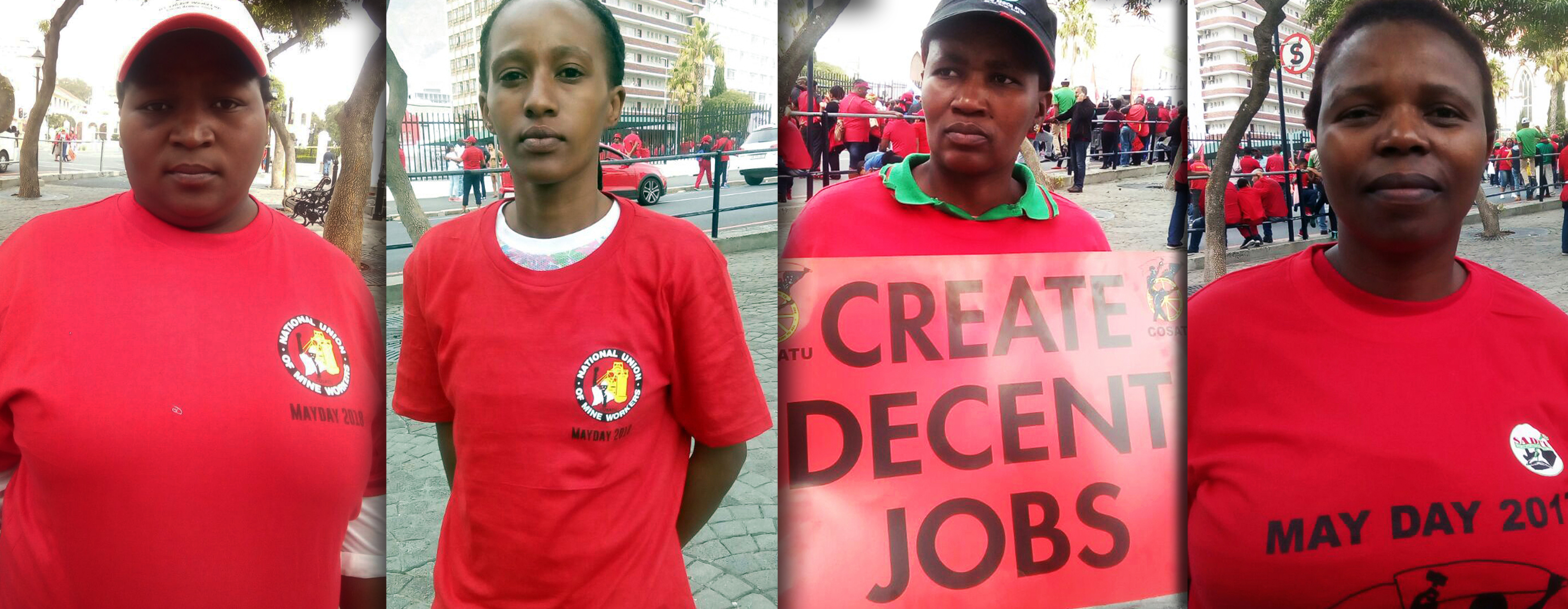May Day
Workers’ everyday struggles laid bare during Cape Town street protest

About 500 workers from various unions in the Congress of South African Trade Unions (Cosatu) gathered at Keizersgracht parking lot on 1 May 2018. Being in Cape Town, the chief target for some was the DA-led Western Cape government, which they claim protects the interests of the elite. Cosatu also complained about the state of public transport in South Africa, and poor living conditions for workers. Daily Maverick spoke to marchers.
Maria Hola, 35, Strand
‘My salary has gone up only by R5o every year for the past four years’
Maria Hola has been a cook for a feeding scheme programme provided to Silukhanyo Primary School learners in Nomzamo, Strand, for four years. For her efforts, Hola is remunerated R1,100 per month. With that, she must provide for her five children, her youngest child being a year old. Hola says that in four years, her income has gone up by approximately R50 per year.
“When I started in 2014, I remember we were earning R960 per month. The next year it went up to R1,000; then it was R1,050, now it’s R1,100. Tell me, how am I supposed to take my children to school with that little money? It’s not enough, and I am a single parent. They say it’s going to go up again this year, but I’m sure it’s going to be another R50. But you know, you stick it through, because you’d rather earn those peanuts than stay at home.”
Hola says she struggled for four years to find a job before she joined Silukhanyo. She claims the DA government in the Western Cape only cares about protecting the rich and whites. The city had jobs available, she says, but not if you are poor and black. Besides working in a few restaurants, Hola does not have much work experience, and says that she only got up to Grade 10. Hola depends entirely on her small income and the grant money from her children to survive, and says she was passionate about joining the march.
“Food goes up, electricity goes up, why can’t our salaries go up?” she says.
Nomahlubi Spayer, 25, Greenfield
‘Ndizolwela amalungelo wam namhanje.’ (I am here to fight for my rights.)
Nomahlubi Spayer is a contract worker at Simanyene High School, just like Hola. She earns R1,800 per month. The mother of two has been working at the school for over two years, and has seen very little improvement in her life. “I only earn enough to survive. My ‘salary’ only covers the bare necessities, rent, school fees and groceries, and even then, I have to stretch it. That is why I am here. I’m tired of being a glorified slave.”
Living conditions were one of the main issues addressed in the memorandum handed over to Parliament. A backyard dweller, Spayer says she understands poor living conditions only too well. “I live in a back room with my two daughters. I can’t afford a proper house, and I will probably not be able to in a long time, because I only get a R50 increase per year.”
Spayer’s only problem with her job is the low income. “Everything else at work is good. The conditions are good, but if the pay is low, it takes away from the good work. If I could, I would find a better job, but no one wants to hire a person who has no matric.”

From left to right: Maria Hola, a volunteer at a local school at the COSATU march. (Photo by Aphiwe Ngalo) Nomahlubi Spayer at the Workers Day March. (Photo by Aphiwe Ngalo), Nolubabalo Buqa stands outside Parliament at the COSATU march on 1 May 2018. (Photo by Hlumela Dyantyi), Teacher Khayakazi Hlengisa Mbenenge at the COSATU march outside Parliament on 1 May 2018. (Photo by Aphiwe Ngalo)
Nolubabalo Buqa, 43, Eerste River
‘I have 42 learners in my classroom from poor backgrounds who need special attention. I am struggling.’
Nolubabalo Buqa is a Grade 6 teacher at Nyameko Primary School in Mfuleni. She has 42 learners in her classroom. Buqa says that even though the school offers meals to learners through a feeding scheme, most of them regularly come to school in the mornings starving, and struggle to concentrate in class as a result.
“I was shocked when I asked them (learners in her classroom) to put up their hands if they don’t have parents, and more than 10 children raised [their hands]. They are coming from a community of barriers and sometimes you see so much potential in a child, but you can’t focus on them alone because there are 31 others crying for your attention.”
Buqa says that because most of her learners are from poor and difficult backgrounds, they need special attention to ensure that the negative things that happen at home do not affect them at school. She says that she and her colleagues are understaffed and overwhelmed at Nyameko Primary School.
According to Buqa, there is a need for more schools to open in Mfuleni, because people from other areas bring their children to Nyameko, and the school does not have capacity. She also says schools in townships need more security: for the teachers, the learners and classroom equipment. A recent break-in at her school led to the stove and some of the pots being stolen. Even though the school now has beefed-up security, with cameras and burglar bars, the new projectors and smart-e learning boards that the school has just received could be at risk of being stolen by desperate, poor community members.
Another of the reason for Buqa attending the march is a 12% increment demand for teachers. “Teaching is the mother of all professions, but we are one of the lowest paid professions. I have three children to take care of. I’m not even going to mention my extended family members: my mother, my brother, and cousins that I support, because of this thing of black tax. Everything is going up but our salaries,” Buqa says.
Khayakazi Hlengisa Mbenenge, 44, Eerste River
“Asikhuselwa ezkolweni, asikhathalelwanga.” We are not protected, no one cares about us.
Mbenenge is a primary school teacher in Eerste River, who is tired of watching the standard of education drop. “Teachers can no longer do their jobs properly. Our classes are overcrowded; the student to teacher ratio is too high.”
The working conditions are not conducive to a teaching and learning environment, argues Mbenenge. “I struggle to give enough attention to all the children. There are way too many pupils, and to add to that, work has become very stressful. You wake up knowing that there is something stressful coming your way, whether it be a lack of resources, or a drunk parent having a field day with you.
“There is no protection for us. Some parents come onto the school premises to threaten us,” Mbenenge adds. “We don’t know how we should discipline the children. When you reprimand a child, you know there is a possibility of a parent coming to swear at you.”
According to Mbenenge, it is not unusual for a teacher to have over 50 children in some township classrooms. This is 10 more learners per teacher than recommended in the learner-education ratio. “More teachers are needed,” Mbenenge explains. “More infrastructure is needed if we want quality education for our children.” DM

















 Become an Insider
Become an Insider